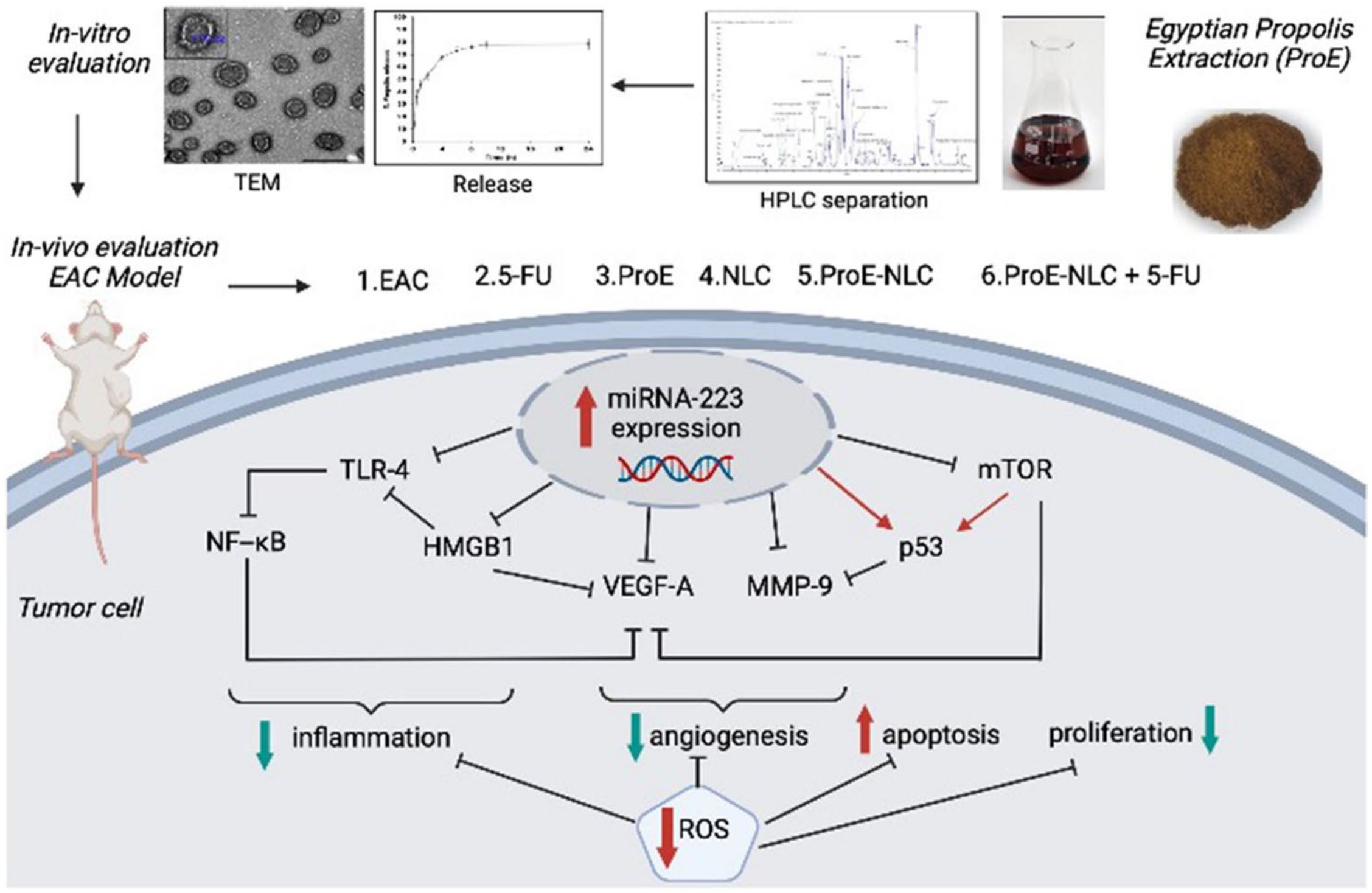Propolis‑loaded nanostructured lipid carriers halt breast cancer progression through miRNA‑223 related pathways: an in‑vitro/ in‑vivo experiment

Abstract
The most frequent malignant tumor in women is breast cancer, and its incidence has been rising every year. Propolis has been used for its antibacterial, antifungal, and anti-inflammatory properties. The present study aimed to examine the effect of the Egyptian Propolis Extract (ProE) and its improved targeting using nanostructured lipid carriers (ProE NLC) in Ehrlich Ascites Carcinoma (EAC) bearing mice, the common animal model for mammary tumors. EAC mice were treated either with 5-fuorouracil (5-FU), ProE, ProE-NLC, or a combination of ProE-NLC and 5-FU. Their effect on different inflammatory, angiogenic, proliferation and apoptotic markers, as well as miR-223, was examined. ProE and ProE-NLC have shown potential anti-breast cancer activity through multiple interrelated mechanisms including, the elevation of antioxidant levels, suppression of angiogenesis, inflammatory and mTOR pathways, and induction of the apoptotic pathway. All of which is a function of increased miRNA-223 expression. The efficiency of propolis was enhanced when loaded in nanostructured lipid carriers, increasing the effectiveness of the chemotherapeutic agent 5 FU. In conclusion, this study is the frst to develop propolis-loaded NLC for breast cancer targeting and to recommend propolis as an antitumor agent against breast cancer or as an adjuvant treatment with chemotherapeutic agents to enhance their antitumor activity and decrease their side effects. Tumor targeting by ProE-NLC should be considered as a future therapeutic perspective in breast cancer.
Introduction
Breast cancer has been the most popular malignant tumor in women, and its prevalence has been rapidly increasing1,2. Te age of disease onset has been decreasing and there has been approximately a 14 percent increase in the mortality rate in the previous 5 years3. Chemotherapy, as well as radiotherapy, has several unwanted side efects, while cancerous cells are also usually resistant to therapy4. Reactive oxygen species (ROS) are known to induce oxidative damage to cell lipids and membranes, nucleic acids, and proteins; eventually leading to several chronic diseases such as atherosclerosis, diabetes, cancer, and other degenerative disorders5–7. Several studies recommended a combination of antioxidants as a possible potent preventive, adjunctive treatment for cancer8,9. Lately, considerable attention has been given to the use of natural compounds for cancer treatment. Among these compounds, propolis (honeybee glue) is a resinous product that has been used as a health food and popular folk medicine for its antibacterial, anti-inflammatory, antioxidative, immunostimulatory, and carcinostatic properties10. However, propolis is known for its reduced solubility and poor bioavailability that hinder its efficacy. Nowadays nanotechnology has been extensively utilized to enhance the efficacy and reduce the toxicity associated with the use of common chemotherapeutics.
In this concern, this work aimed to utilize nanostructured lipid carriers (NLC) to overcome these challenges. Among several lipid-based nanocarriers, NLC proved to be superiorly effective for anti-cancer drug delivery compared to nano emulsions that are subjected to phase separation problems and liposomes that may suffer from instability problems. Moreover, they offer superior drug loading capacity, enhanced stability, controlled drug release, and easier large-scale production11–14.
NLC are biodegradable, biocompatible nanocarriers that have been extensively reported to sustain the release and enhance the bioavailability as well as the therapeutic efficacy of several anti-breast cancer drugs15–18. Based on the above-mentioned benefts of NLC for breast cancer targeting, the present study aimed to prepare and evaluate Propolis Extract (ProE) loaded NLC for improved targeting to different inflammatory, angiogenic, proliferation, and apoptotic markers as well as, mTOR and miR-223 related pathways in Ehrlich Ascites Carcinoma (EAC) bearing mice. To our knowledge, this study is the frst to develop propolis-loaded NLC as a novel delivery system for breast cancer targeting, with excellent physicochemical properties and good stability, and to explore its efficacy when used alone or as adjuvant therapy.
Download the full article as PDF here Propolis‑loaded nanostructured lipid carriers halt breast cancer progression through miRNA‑223 related pathways: an in‑vitro/ in‑vivo experiment
or read it here
Materials
Precirol® ATO 5 (P ATO 5), was gifted by Gattefosse, France. Castor oil, Morgan Specialty Chemicals, Cairo, Egypt. Miglyol® 812 N, was a kind gift from Medizen Pharmaceutical Industries, Alexandria, Egypt. Kolliphor® P 188 (Pluronic F68; P F68) and Kolliphor® P 407 (Pluronic F127; P F127), were obtained as gift samples from BASF, Germany. Visking® dialysis membrane size 36/32, 24 mm, MWCO 12,000–14,000; was obtained from Serva, Germany. Propolis was purchased from an Egyptian bee breeder in Damnhour, Egypt. Authentic reference materials for colorimetric assay were purchased from Sigma-Aldrich. All other chemicals were of analytical grades.
Shaker, S.A., Alshufta, S.M., Gowayed, M.A. et al. Propolis-loaded nanostructured lipid carriers halt breast cancer progression through miRNA-223 related pathways: an in-vitro/in-vivo experiment. Sci Rep 13, 15752 (2023). https://doi.org/10.1038/s41598-023-42709-7

